Is Dropping Out of College the Key to Entrepreneurial Success?
September 10, 2020

While much of the world feels like it’s crumbling to pieces, Amazon’s success during the pandemic has propelled Jeff Bezos to surpass anyone else on earth. He’s reached a net worth of $200 billion. His fortune equates to 1% of U.S. gross domestic product, according to the Department of Commerce. If all of his assets were liquidated, he could spend $1 million a day for the next 547 years. Must be nice, Bezos.
When most people think about entrepreneurs, they likely picture Steve Jobs, founder of Apple. Or Jan Koum, founder of WhatsApp. After landing a job with Yahoo! as an infrastructure engineer, he soon dropped out of San Jose State University. However, Koum bid farewell to Yahoo! and decided to explore South America and play ultimate frisbee.
Maybe Mark Zuckerberg, too. The founder of Facebook enrolled at Harvard University in 2002, before dropping out in 2004. Rachael Ray studied literature and communications at Pace University for two years before she left to reconsider her career goals. Later, she emerged as a prominent author, television host, and businesswoman with a net worth of $100 million.
Many of these brilliant minds came up with ideas while studying, and then drop out of Ivy-League schools to tinker and develop computer programming in their garages, eventually building multi-million dollar enterprises.
The odds of that happening to most people, we must admit, are slim. But what if creativity could be tinkered in the classroom, as opposed to in the garage? What if the next innovative idea didn’t come from dropping out?
What Do Successful Entrepreneurs Possess That We Don’t?
Take a moment to predict the mean age of the founders of the 1,700 fastest growing venture firms in the U.S.
Anyone? Anyone? Research from MIT and Northwestern University’s Kellogg School of Management reveals a whopping age of 45.

If you haven’t hit 45, there’s hope for you yet to age into becoming the next successful entrepreneur. But what if we don’t have to wait for years of experience to wisen us?
The Secret to Success
Entrepreneurs tend to have more experience effectively running a company’s operations, marketing, sales, finance, human resources, and cultural awareness.
What success ultimately boils down to is experience.
Successful entrepreneurs that tinker in their garages are building experience. But putting knowledge into practice doesn’t have to be limited to the garage. Realizing ideas and putting innovations into practice can develop in classroom experiences, too.
More seasoned entrepreneurs have access to greater human, social, and financial capital.
Human capital, an intangible asset, includes education, training, intelligence, skills, and health. These assets develop and age over time, like fine wine. Social capital brings indirect wealth to a company.
Mentors, friends, peers, family, and other entrepreneurs contribute to your value in social capital.
Financial capital is the sum of all of your assets minus your debts – your net worth, in other words.
The question remains: What role does education play in this? Schools need to figure that out. Educational institutions need to develop entrepreneurs and skills. You don’t need to drop out to get these experiences. You can create them in the classroom.
Steve Jobs failed tremendously and got booted from Apple. He later returned to save the company from impending doom.
There’s an evident propensity for action, and an immense dichotomy: many entrepreneurs are wildly successful outside of the classroom, after dropping out of school.
The opportunity exists in developing entrepreneurs’ skills in the classroom, so they won’t need to drop out to gain real-world experiences. Not everyone can afford to do so.
Education is supposed to help. But recent graduates are missing key soft skills to leverage their human, social, and financial capital. The gaps exist in leadership, communication, problem-solving, time management, and initiative.
Certainly, you can read about the attributes of strong leaders, or what it takes to be an effective communicator. But skimming words on a page doesn’t translate to real-life application.
The skills needed and often overlooked by schools can be instilled with the right tools.
As an educator, you have the power to empower your students early on in the classroom, with engaged learning. We encourage learning from mistakes in the classroom: fail early and fail often, so we can achieve milestones sooner.
Simulation-Based Learning in the Classroom Translates to Real-World Experiences in the Workplace
Authentic assessments and simulation-based learning best prepare students to tackle the real-world with complex situations they will face in the office.
Educators have the power to prepare learners for career success. The transition from college to the workforce doesn’t have to be painstaking. In fact, it can be an opportunity for students to showcase their critical thinking skills and reflect them in their new roles with ceaseless transitions.
Before students enter the workforce, show them a clear path forward to develop professional skills inside of the classroom. Encourage learning and failure in the safety of a controlled environment, where the stakes are low, and the potential for learning is immeasurable.
Recent graduates don’t possess key attributes in the workplace, which leads to problems with interpersonal relationships, failure to meet business objectives, an inability to build and lead a team, an inability to develop or adapt, and workers who are too functionally or technically oriented.
For example, with CapsimInbox, we’ve created an easy and effective way to evaluate students on their real-world responses in an email environment. CapsimInbox measures key career skills with every reply.
As an educator, your main focus should rest on teaching your students, not the added responsibility of creating methods to engage them. We’ve done the hard work for you. With the CapsimInbox Authoring Platform, we’ve created a transformative way to bring authentic, experiential learning to every environment.
Bridging the Gap in Soft Skills to Build Entrepreneurs
Entrepreneurs are made, not born. Why the magic number of 45? Older entrepreneurs have experience working at and running successful companies.
In today’s constantly shifting environment, we need to better prepare students to understand customer needs and constraints. Educators have the power to instill values in students that employers seek early on in their educational journeys.
Developing soft skills helps students in immediate employability and in future promotability.
Let’s build young entrepreneurs, beginning in the classroom, and simultaneously diminish the existing soft skills gap. Let’s create better-prepared employees for the workforce.
How will you integrate teaching methods to educate the next generation of entrepreneurs?
Leverage Your Expertise with Simulations
Are you looking to transform your classroom with engaging and meaningful learning experiences? Check out our website.




.png?width=80&name=1-questions%20(1).png)